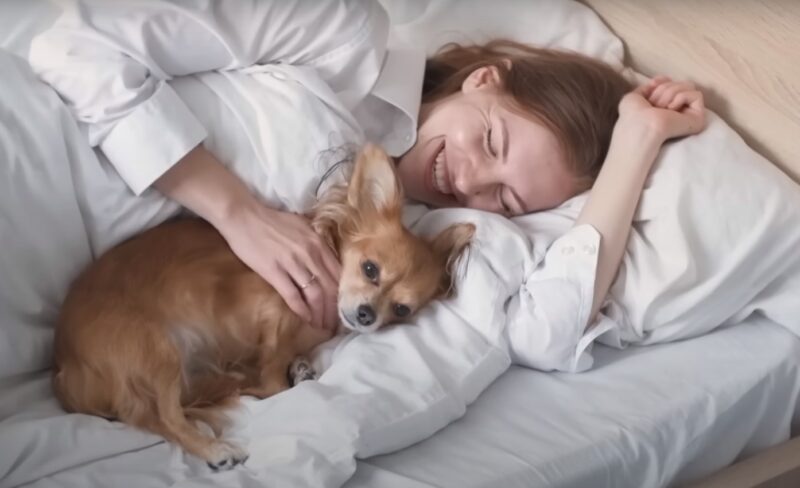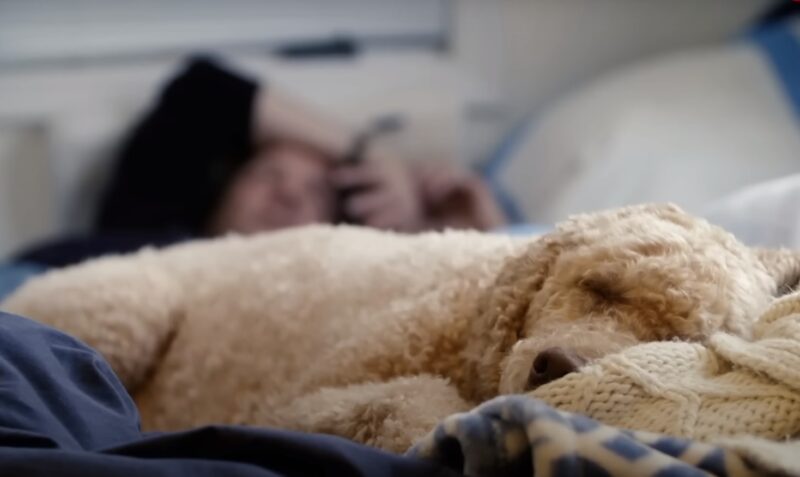Does your dog sleep in your bed with you, or does she try to, but you do not allow it? Whether you allow her to sleep in your bed or not, the simple reason she wants to join you is because she loves you. She wants to be close to her human.
But there’s more to it than that. It all harkens back to the behavior of your dog’s ancient wolf ancestors. Wolves are pack animals, and like most pack animals, they share affinity for one another, so they sleep together as a pack. Sleeping as a pack also provides extra warmth and security.
This instinct to be a part of a pack remains with dogs. Since you’re the leader of your dog’s pack, she wants to be near you.
There are other reasons why dogs want to sleep with their owners. Another wolf instinct that persists in modern dogs is the need to protect its pack, especially the offspring of its alpha male and female (you). When a new member is introduced to the pack—like a newborn baby—your dog’s protective instincts kick in. That’s why dogs are often so protective of babies and young children. When your dog sleeps with you in your bed, she’s also on guard duty.
Sleeping with Dogs Is Not a Fad

Some say people humanize our pets more than ever before. According to a 2011 Harris poll, 90% of pet owners think of their pets as family members. A survey by the American Pet Products Association found that nearly half of dogs sleep in their owner’s beds (62% of small dogs, 41% of medium-sized dogs, and 32% of large dogs).
But sharing beds with dogs isn’t a fad. Humans have long shared their beds with dogs. According to an article in Psychology Today:
- Egyptian pharaoh, Ramses the Great, had a hound named Pahates who was given the title “Bed Companion to the Pharaoh.”
- Alexander the Great slept beside his greyhound, Pertias, between battles.
- Queen Victoria died in bed next to her favorite Pomeranian, Turi.
- Peter the Great, Czar of Russia, slept with his Italian greyhound, Lisette.
- Fredrick the Great of Prussia slept with an Italian Greyhound named Biche.
Why Do We Want to Share Our Beds with Dogs?

We understand why dogs want to share our beds, but how come so many of us are happy to share our beds with dogs? The previously cited Psychology Today article posits that for “most people, having a dog in bed is psychologically comforting. The dog serves as a loving companion close at hand, and it keeps you from feeling lonely or insecure no matter how dark the night.”
As already pointed out, dogs are on “guard duty,” which makes some people feel safer. In the past, many people didn’t have adequate indoor heat. A dog’s body temperature is 104 °F or 40°C, which is hotter than ours; thus, dogs served as natural “heaters.” That’s where the term “a three-dog night” comes from—on really cold nights, a person needed three dogs in bed to keep warm.
Should I Share My Bed with My Dog?
There are no health reasons why you shouldn’t share your bed with your dog, unless you’re allergic. If you’re a light sleeper and your dog’s movements wake you up—or if your dog snores loudly, or hogs the covers and pillows—you might want to reconsider. If your significant other doesn’t want a dog in the bed, that’s something you’ll have to hash out together.
Remember, sleeping with your dog is your choice—not your dog’s. Decide what is right for you.
Do you let your dog sleep in your bed? If so, why? If not, why not?
FAQ
How can I train my dog to sleep in its own bed if it’s used to sleeping in mine?
Gradually transition your dog by placing its bed near yours and rewarding it for staying there, slowly moving it farther away over time.
Can sleeping with my dog affect its behavior during the day?
It’s possible. Dogs that are overly attached may develop separation anxiety, but this varies based on the individual dog’s temperament.
Is it safe for a newborn baby to sleep in the same bed as a dog?
t’s generally not recommended due to safety concerns like accidental suffocation or the dog’s unpredictable reactions.
How can I ensure hygiene if my dog sleeps in my bed?
Regular grooming, bathing your dog, and washing the bed linens frequently can help maintain hygiene.
Are there specific breeds of dogs that are better suited for sleeping in a bed with humans?
Smaller breeds are often more suited due to their size, but it also depends on the individual dog’s behavior and health.
Can a dog sleeping in my bed disturb my sleep pattern?
Yes, dogs can move around or make noises during the night, potentially disturbing your sleep.
Should I consult my veterinarian before allowing my dog to sleep in my bed?
It’s a good idea, especially if your dog has health issues or if you have allergies or other medical concerns.
Final Words
Choosing to share your bed with your dog is a deeply personal decision that intertwines with the unique bond you share with your pet. It’s a practice rooted in history and influenced by the natural instincts of our canine companions.
Whether for comfort, security, or simply the joy of close companionship, this choice reflects the special relationship between humans and their dogs. It’s essential to consider all aspects, from sleep quality to health concerns, ensuring that this arrangement benefits both you and your furry friend.
